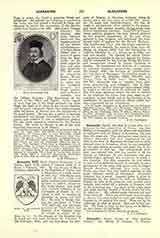

Alexander, Saint, known as “The charcoal burner,” was Bishop of Comana, in Pontus.
Whether he was the first to occupy that see is open to discussion. The Bollandists have also a long paper as to the exact location of Comana as there were several places of that name, but decide for Pontus, near Neo-Caesarea. The curious name of the saint comes from the fact that he had, out of humility, taken up the work of burning charcoal, so as to escape worldly honors. He is called a philosopher, but it is not certain that the term is to be taken literally. His philosophy consisted rather in his preference of heavenly to earthly things. The discovery of his virtues was due to the very contempt with which he had been regarded. St. Gregory Thaumaturgus had been asked to come to Comana to help select a bishop for that place. As he rejected all the candidates, some one in derision suggested that he might accept Alexander the charcoal-burner. Gregory took the suggestion seriously, summoned Alexander, and found that he had to do with a saint, and a man of great capabilities. Alexander was made bishop of the see, administered it with remarkable wisdom, and ultimately gave up his life for the Faith, being burned to death in the persecution of Decius. The vagueness of the information we have about him comes from the fact that his name is not found in any of the old Greek or Roman calendars. He would have been absolutely unknown were it not for a discourse pronounced by St. Gregory of Nyssa, on the life of St. Gregory Thaumaturgus, in which the election of Alexander is incidentally described. In the modern Roman Martyrology his name occurs, and he is described as a “philosophus disertissimus.” His feast is kept on August 11.
T. J. CAMPBELL

